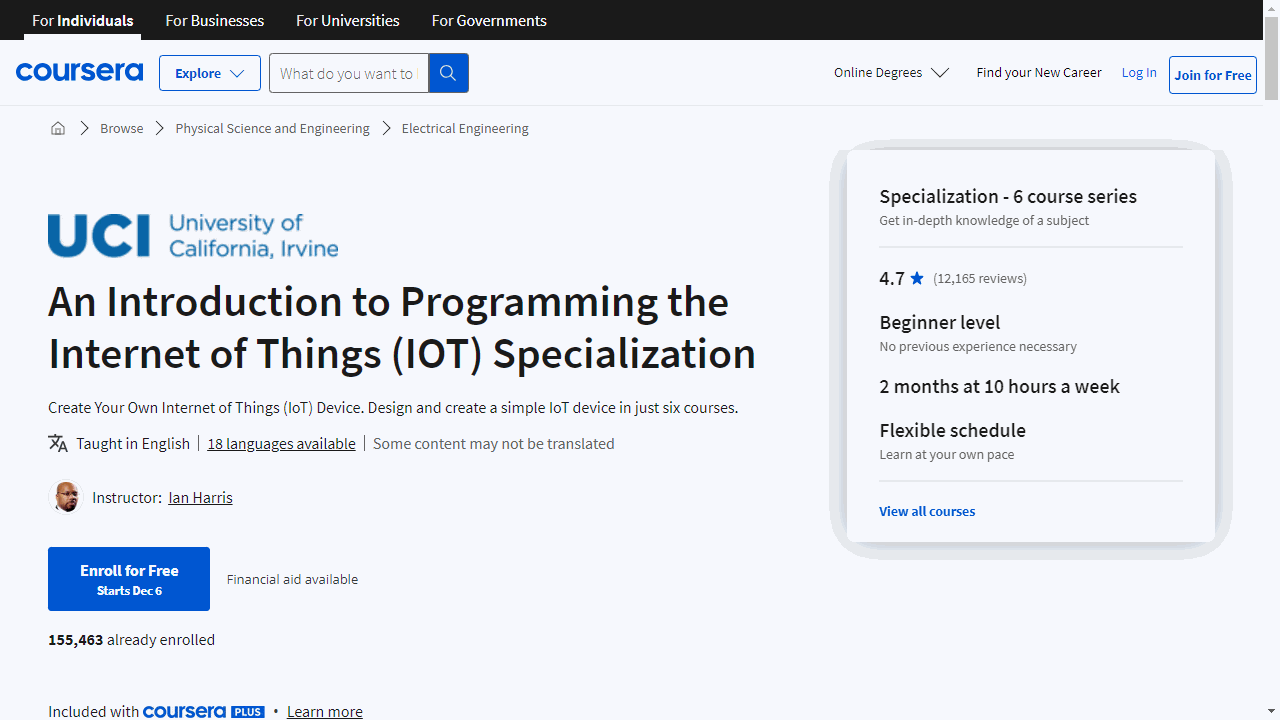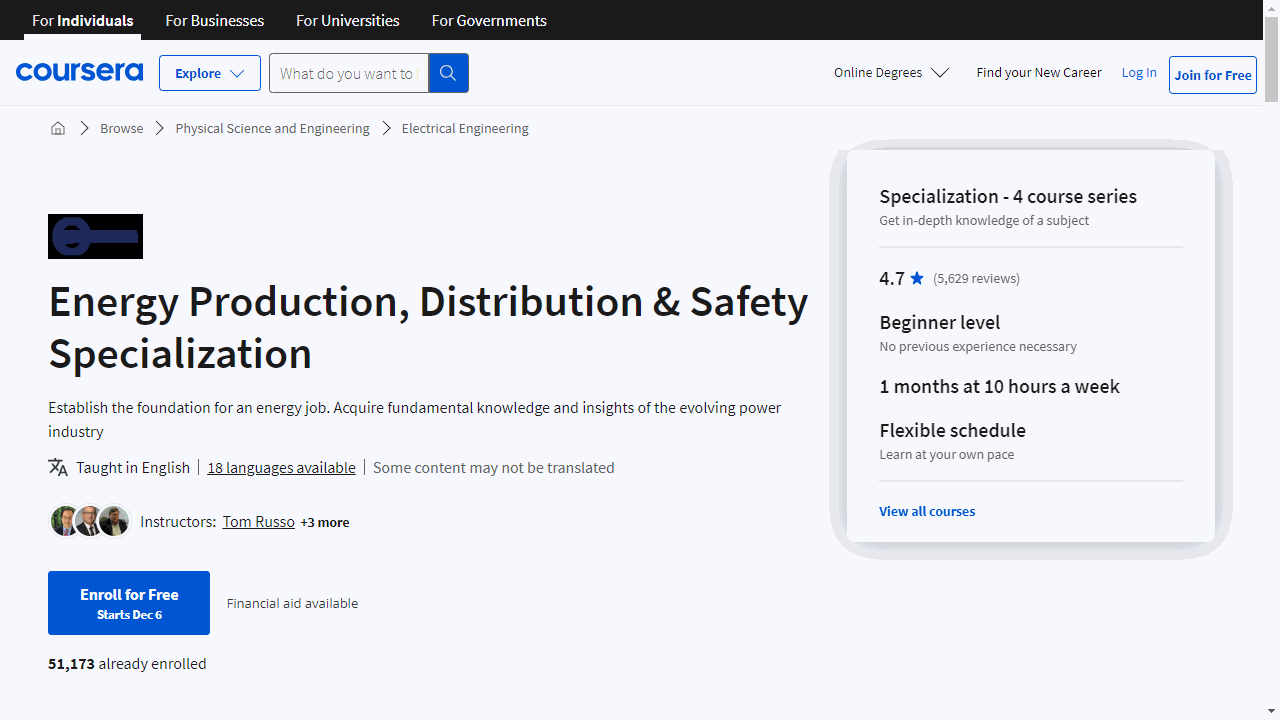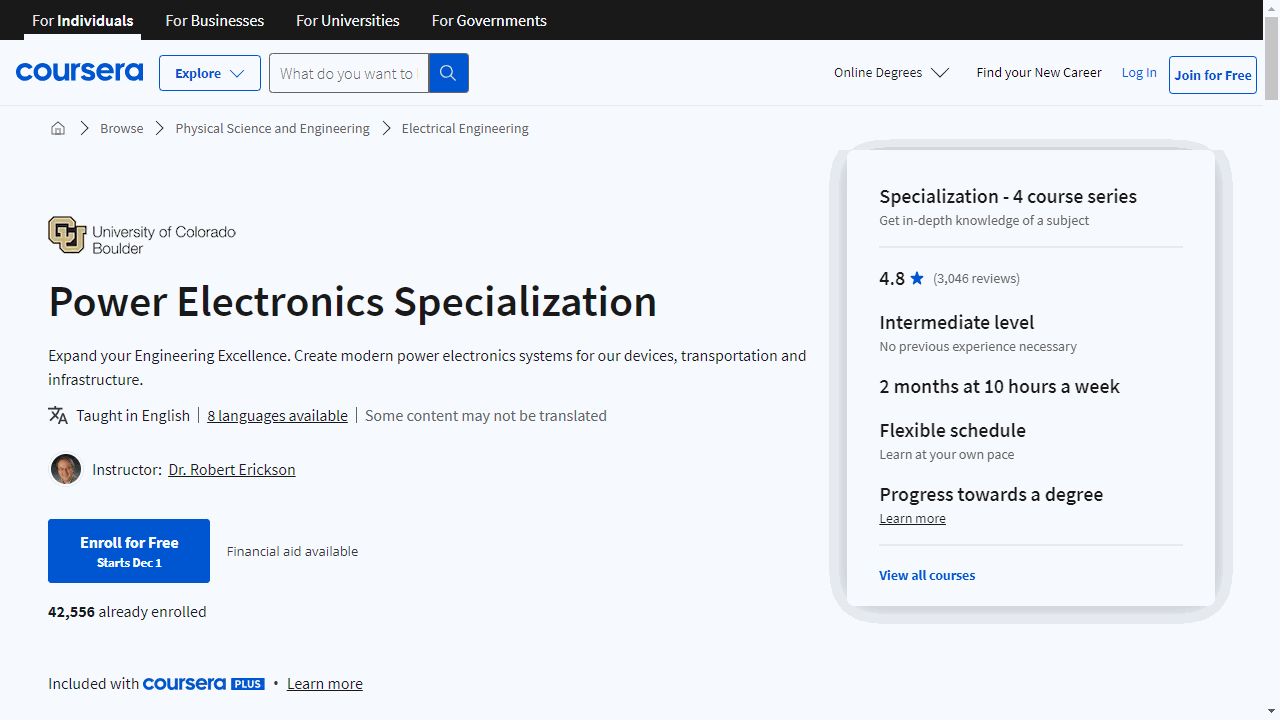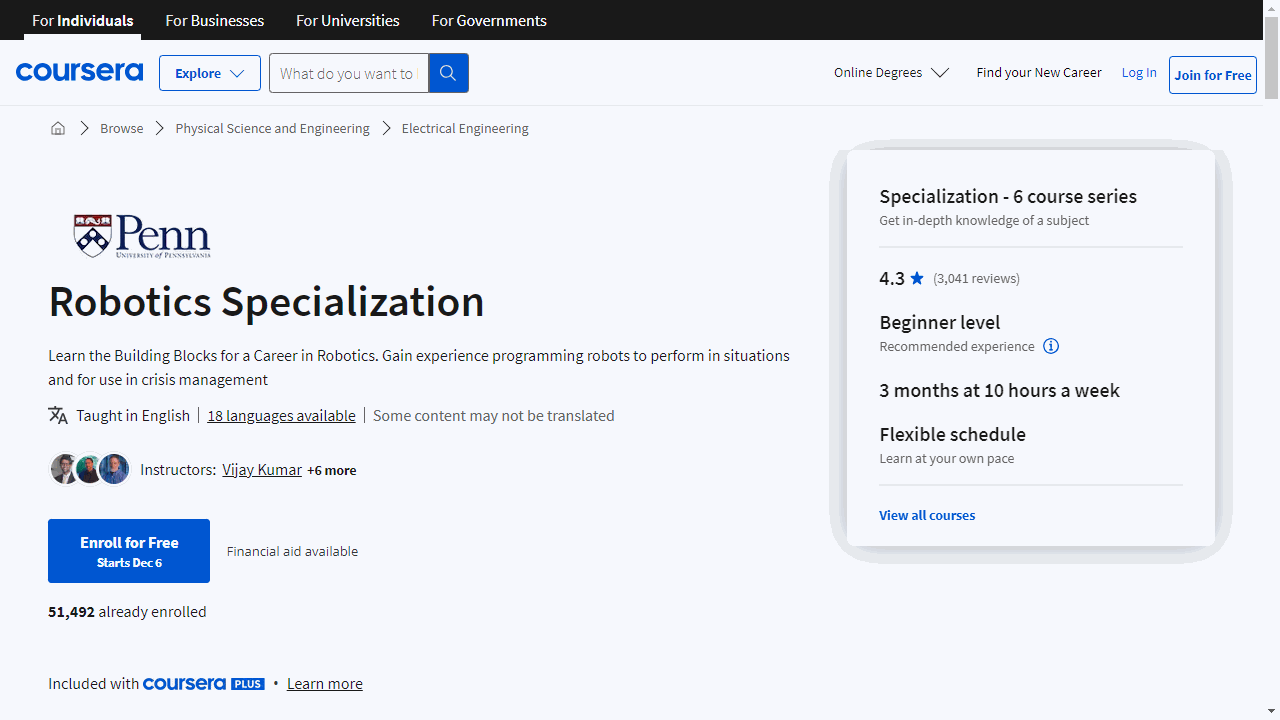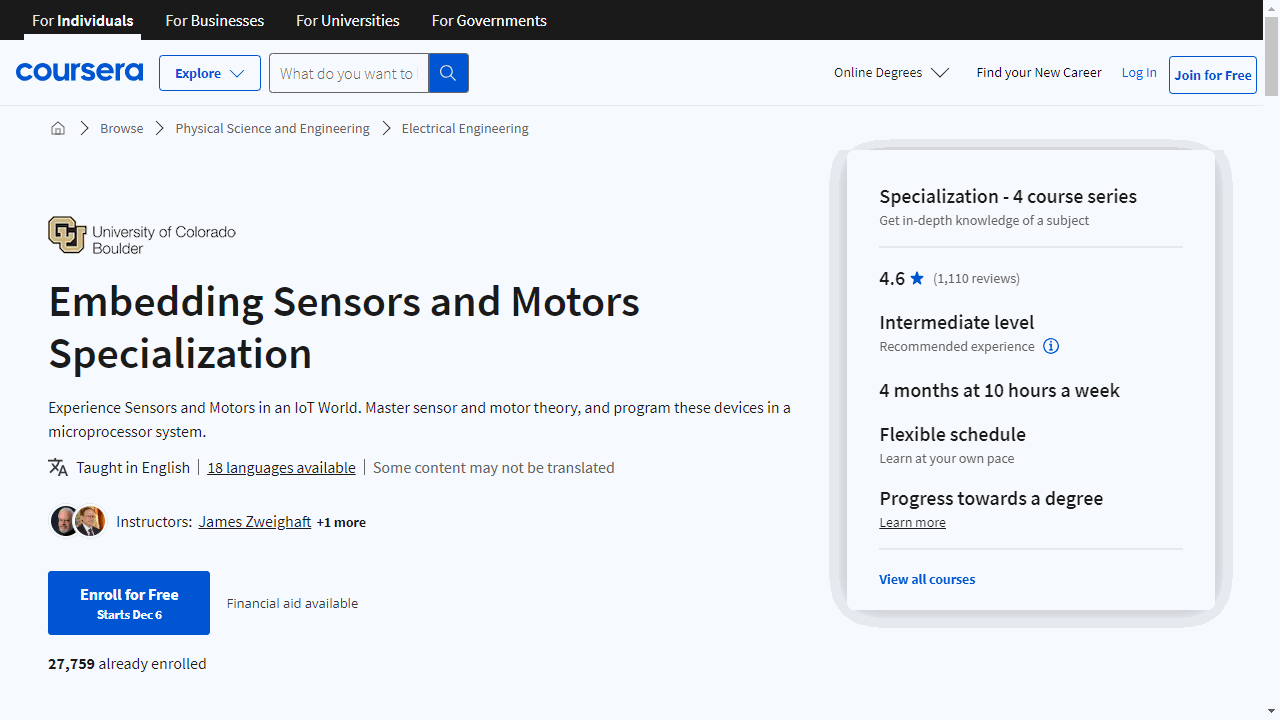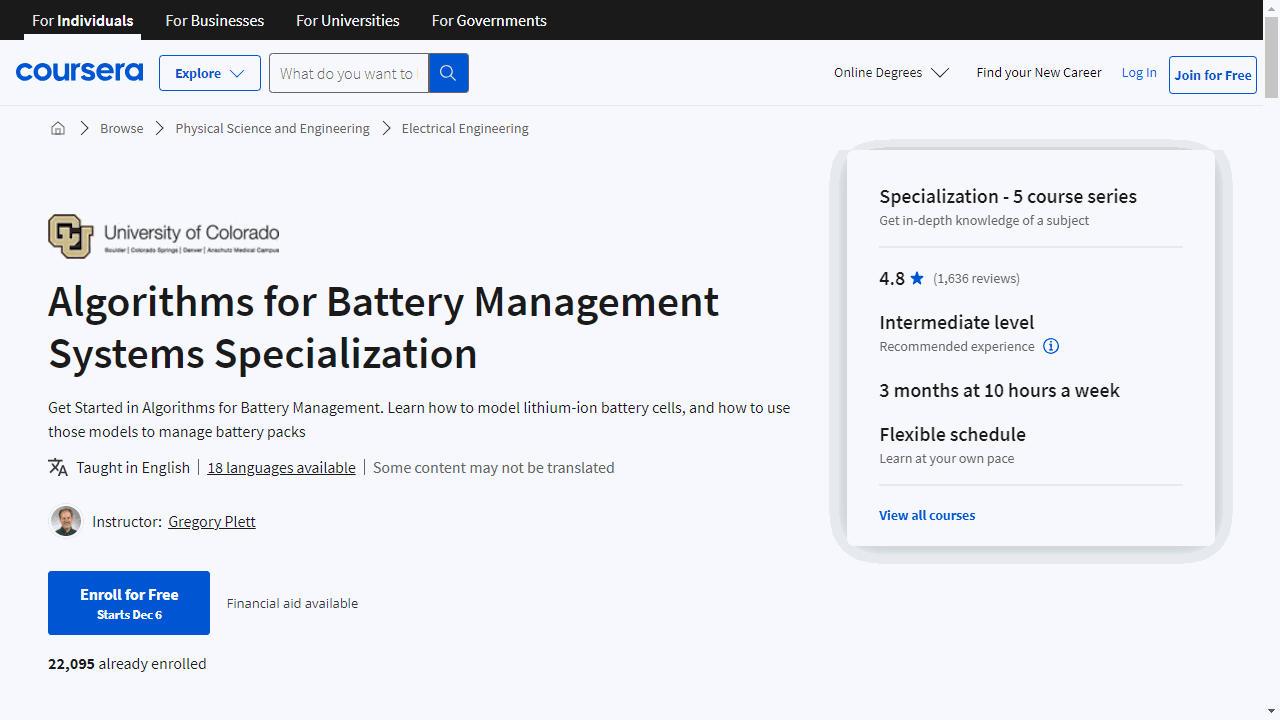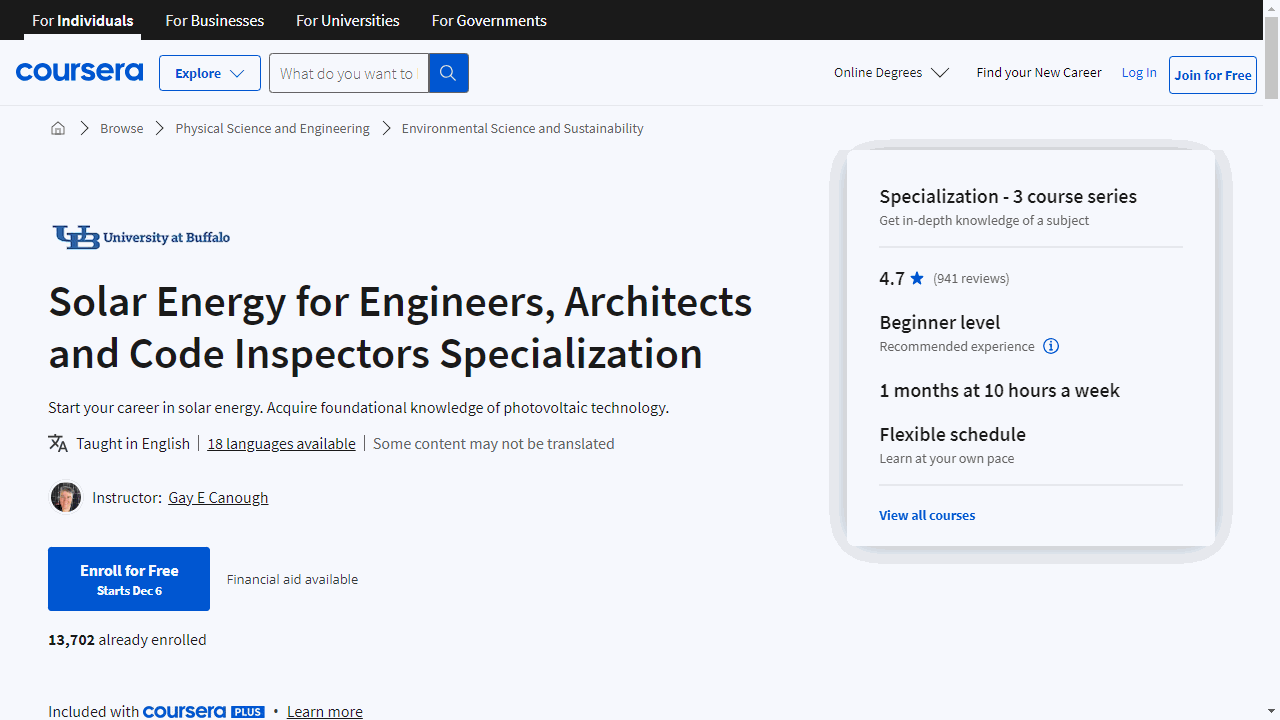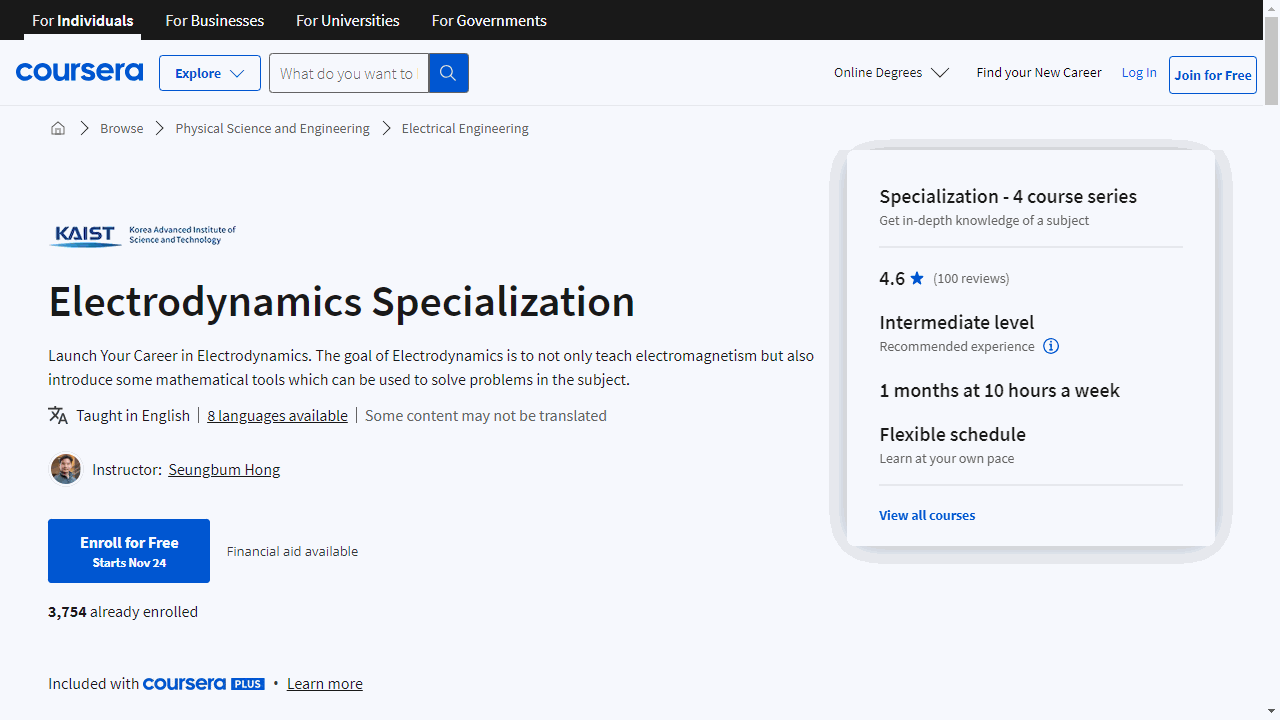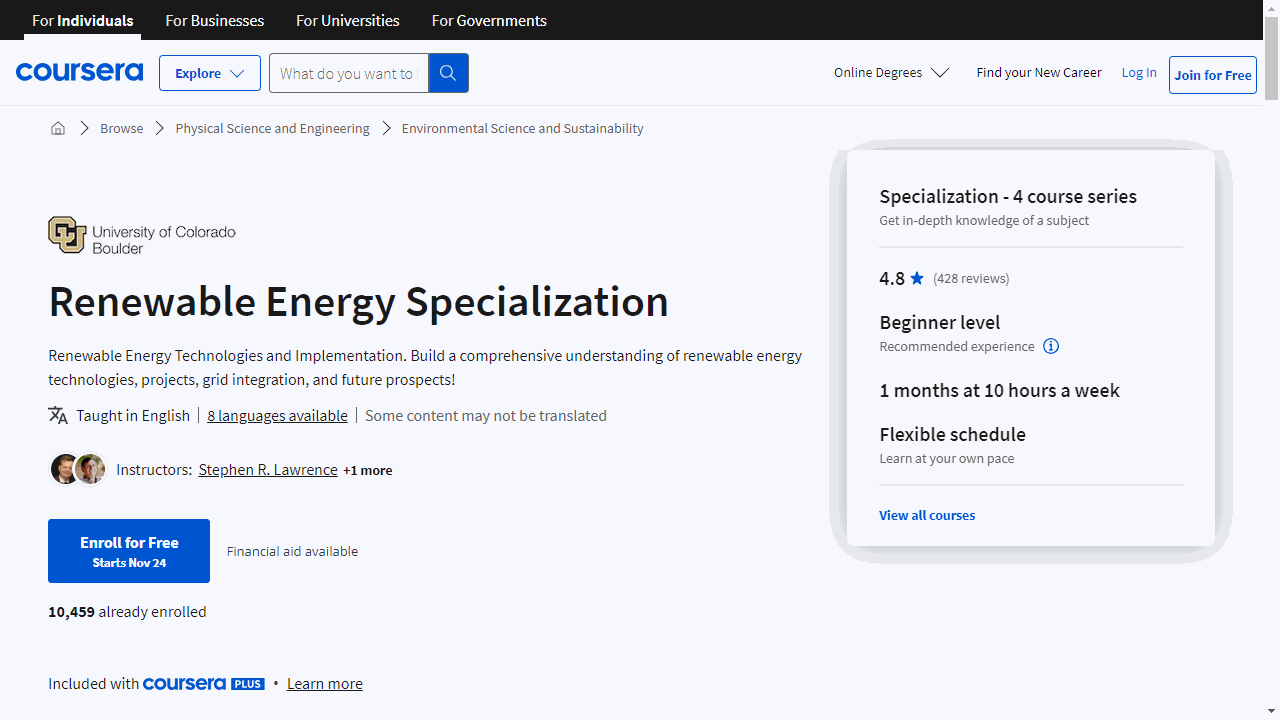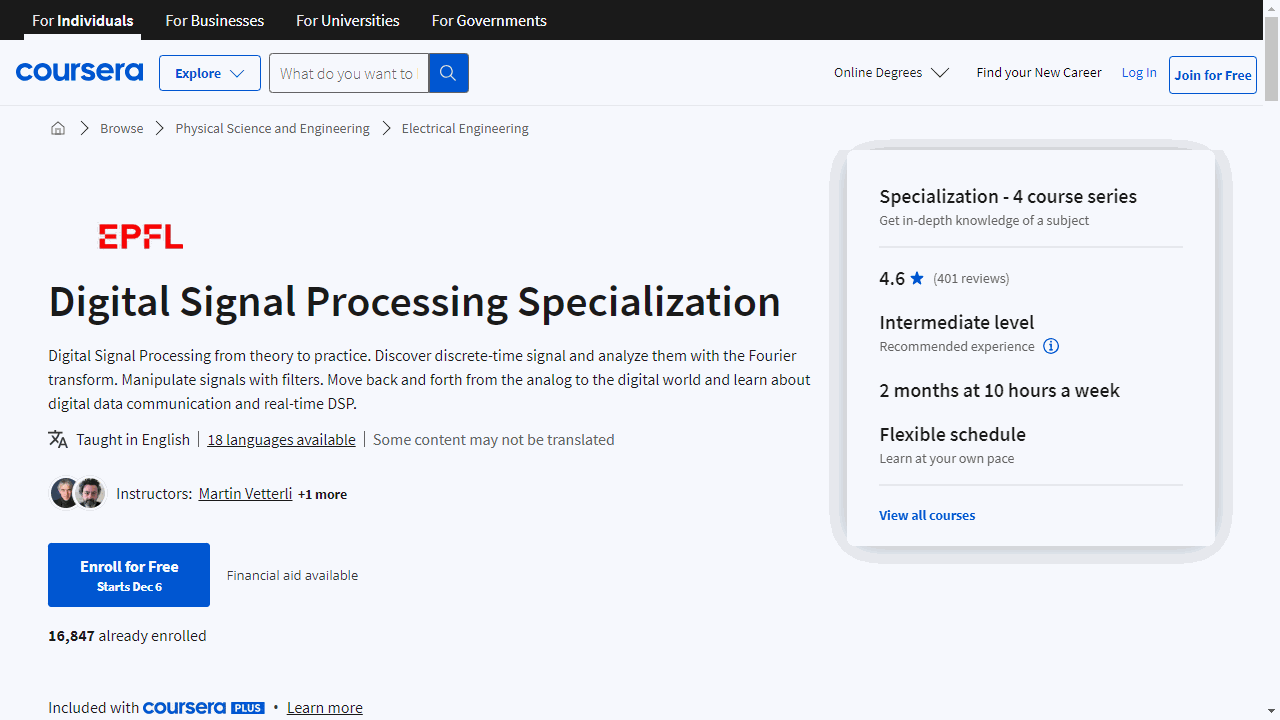Electrical engineering is a dynamic field that underpins countless aspects of modern life, from powering our homes and cities to developing cutting-edge technologies like electric vehicles and renewable energy systems.
Understanding the principles of electricity, circuits, and electronics is essential for anyone interested in shaping the future of technology.
By learning electrical engineering, you can unlock exciting career opportunities in various industries, ranging from traditional power generation to the burgeoning field of robotics and automation.
Finding the right electrical engineering course on Coursera can be a challenge, with numerous options catering to different levels and specializations.
You might be seeking a comprehensive overview, a deep dive into a specific area, or a course that aligns perfectly with your career goals.
For the best electrical engineering course overall on Coursera, we recommend the “Power Electronics Specialization” offered by the University of Colorado Boulder.
This specialization provides a robust foundation in the design and analysis of power electronic circuits, equipping you with valuable skills for developing efficient and reliable systems.
The instructors are experts in the field, offering insightful lectures and practical exercises that make learning engaging and impactful.
This is just the beginning of your electrical engineering journey on Coursera.
We have a diverse selection of courses covering various aspects of the field, from basic circuit analysis to advanced topics like signal processing and embedded systems.
Continue reading to explore our recommendations and discover the perfect electrical engineering course for your individual needs and ambitions.
An Introduction to Programming the Internet of Things (IOT) Specialization
This specialization offered by University of California, Irvine equips you with the essentials of IoT and embedded systems, focusing on practical applications and hands-on learning.
The journey begins with “Introduction to the Internet of Things and Embedded Systems,” where you’ll grasp the significance of IoT and its societal impact.
You’ll learn about the components that make up IoT devices, including interfacing with the physical world and networking basics.
Skills in Arduino and Python programming are key takeaways.
Moving on to “The Arduino Platform and C Programming,” you’ll get familiar with the Arduino board, understanding its hardware and software aspects.
You’ll also learn to program in C, manage input and output pins, and use shields for expanded functionality.
In “Interfacing with the Arduino,” the focus shifts to connecting sensors and interpreting signals.
This course is crucial for learning how to make your devices interact with their environment.
“The Raspberry Pi Platform and Python Programming for the Raspberry Pi” introduces you to this compact computer.
You’ll set up the Raspberry Pi, run Linux, and execute Python code, gaining valuable programming and hardware knowledge.
“Interfacing with the Raspberry Pi” builds on this by teaching you to communicate with external devices using various protocols.
This course is essential for creating sophisticated IoT devices that can sense and act upon data.
The capstone, “Programming for the Internet of Things Project,” challenges you to design and potentially build a microcontroller-based system, integrating all the skills you’ve acquired.
Energy Production, Distribution & Safety Specialization
This specialization offered by The State University of New York equips you with a deep understanding of the energy sector’s key aspects.
Starting with “Electric Power Systems,” you’ll delve into the utility industry’s standards and policies, learning the language of the business.
You’ll trace the journey of electricity from generation to the outlet, getting to know system segments and components like transformers and power cables.
This course is ideal if you’re aiming to enter the energy field or need to strengthen your foundational knowledge.
Moving on to “Natural Gas,” you’ll explore the properties of this energy source, understand gas system components, and examine new pipeline technologies.
You’ll also learn about the industry’s development and essential safety procedures for gas handling.
In “Safety in the Utility Industry,” you’ll gain critical knowledge about workplace safety, including the use of personal protective equipment and the identification of hazardous materials.
This course emphasizes the importance of a secure work environment in the energy sector.
Finally, “Energy: The Enterprise” offers a panoramic view of the energy field, discussing the balance between cost, availability, sustainability, and technological progress.
You’ll gain insight into the energy infrastructure’s adaptation to a changing landscape and the workforce’s evolution.
Each course is a blend of online lectures, videos, readings, and discussions, providing a dynamic learning experience.
You’ll also engage in a project to create a professional development roadmap in the energy sector.
Power Electronics Specialization
Offered by University of Colorado Boulder.
Starting with “Introduction to Power Electronics,” you’ll grasp the essentials of switched-mode converter circuits.
This foundational course sets you up to confidently analyze and optimize power systems for efficiency—a critical skill in both consumer electronics and larger-scale electric vehicles.
Progressing to “Converter Circuits,” you delve deeper into the technicalities of power semiconductors and their role in modern inverters and converters.
You’ll get hands-on experience with circuit topologies, including those that incorporate transformer isolation—a key component in ensuring safe power conversion.
In “Converter Control,” the focus shifts to the precision of power management.
You’ll learn to design feedback systems that regulate and refine the performance of switching regulators.
This course is about fine-tuning power systems to respond swiftly and maintain stability under varying conditions.
Lastly, “Magnetics for Power Electronic Converters” rounds out your expertise by demystifying the role of magnetic components in power conversion.
You’ll tackle the design and optimization of inductors and transformers, ensuring that your power systems are not only functional but finely tuned for peak performance.
Robotics Specialization
This series of courses from University of Pennsylvania equips you with practical skills and a deep understanding of robotics.
Start with “Robotics: Aerial Robotics” to delve into quadrotor design and the principles of flight.
You’ll develop dynamic models and controllers, crucial for autonomous drone operation.
A background in linear algebra, calculus, and differential equations, along with MATLAB experience, will help you succeed.
Move on to “Robotics: Computational Motion Planning,” where you’ll tackle the complexities of robotic decision-making.
Learn to navigate obstacles using graph-based methods and randomized planners.
Python programming knowledge will be your tool here.
In “Robotics: Mobility,” discover how robots achieve movement across diverse terrains.
You’ll study the dynamics of legged machines and the creation of sensorimotor programs, enhancing your understanding of robotic locomotion.
“Robotics: Perception” shifts your focus to robotic vision.
You’ll transform camera images into 3D data, enabling robots to navigate and manipulate their environment.
Skills in computer vision and geometry are central to this course.
“Robotics: Estimation and Learning” introduces you to probabilistic models and Bayesian filtering, essential for robots to interpret sensor data and adapt to their surroundings.
Mastery of motion planning and familiarity with MATLAB will be advantageous.
The “Robotics: Capstone” is where you apply your knowledge.
Choose between simulating a mobile inverted pendulum with MATLAB or constructing a rover that navigates autonomously.
This hands-on project demonstrates your ability to translate theoretical knowledge into practical solutions.
Embedding Sensors and Motors Specialization
This specialization offered by University of Colorado Boulder is part of a Master’s degree program.
Starting with “Sensors and Sensor Circuit Design,” you’ll gain the skills to select and implement various sensors into embedded systems.
You’ll learn to manage signal noise and integrate hardware with microprocessors for real-time data processing.
Essential components like the PSOC 5LP PROTOTYPING KIT and an oscilloscope are required, and you’ll find a detailed list of parts in the course content.
Moving on to “Motors and Motor Control Circuits,” you’ll deepen your understanding of motor selection and control.
This course emphasizes the practical application of motor equations and feedback data integration, essential for designing effective motor control circuits.
In “Pressure, Force, Motion, and Humidity Sensors,” you’ll explore a range of sensors and learn to incorporate them into embedded systems.
You’ll build circuits, develop firmware, and process signals for accurate real-time monitoring.
Finally, “Sensor Manufacturing and Process Control” offers insight into the production of sensors and the intricacies of process control.
You’ll learn about sensor calibration, PID control, and manufacturing methods for electro-mechanical and micro-machined sensors.
You’ll need additional equipment like wires, a breadboard, and an oscilloscope, which are vital for the hands-on projects.
Remember to check the required parts list to fully engage with the course projects.
Algorithms for Battery Management Systems Specialization
This specialization is offered by University of Colorado System.
Dive into the “Introduction to battery-management systems” course to build a solid foundation.
You’ll grasp lithium-ion cell functions and the essentials of battery-management systems, learning to measure current, temperature, and energy storage capacity.
This course equips you with the vocabulary and technical understanding to navigate the field confidently.
Progress to “Equivalent Circuit Cell Model Simulation,” where you’ll dissect battery cell behavior through equivalent-circuit models.
Using lab data, you’ll refine these models and simulate electric vehicle performance, gaining hands-on experience with tools like Octave/MATLAB.
In “Battery State-of-Charge (SOC) Estimation,” you’ll tackle the challenge of gauging a battery’s charge level.
Through various estimation methods and scripts, you’ll sharpen your ability to deliver precise SOC readings, a critical skill for battery management.
“Battery State-of-Health (SOH) Estimation” teaches you to assess battery longevity and performance.
You’ll identify degradation mechanisms and use scripts to estimate capacity, becoming adept at ensuring battery reliability.
Lastly, “Battery Pack Balancing and Power Estimation” guides you through designing balancing systems and calculating a battery pack’s remaining energy and power.
You’ll learn to design systems that maintain cell balance and predict power availability, rounding out your expertise.
You can even earn academic credit towards CU Boulder’s Master of Science in Electrical Engineering degree.
Solar Energy for Engineers, Architects and Code Inspectors Specialization
This specialization is offered by University at Buffalo, part of the State University of New York.
It’s a practical choice for electrical engineering enthusiasts aiming to master solar technology.
Start with “Solar Energy Systems Overview” to grasp the basics of photovoltaics (PV).
You’ll compare solar cells, outline PV systems, and understand the economics of solar energy.
This course is a solid foundation if you’re new to the field or transitioning from another industry.
Move on to “Solar Energy and Electrical System Design” to deepen your design skills.
You’ll evaluate sites, address efficiency, and navigate electrical and mechanical design aspects of PV systems.
This course suits you if you have a background in electrical engineering or a related field.
The “Solar Energy Codes, Permitting and Zoning” course is crucial for ensuring compliance.
You’ll learn to interpret building codes, manage the permitting process, and understand zoning for PV installations.
If you’re a code inspector or involved in the installation process, this knowledge is indispensable.
Each course is enriched with interactive materials like lectures, videos, and projects, ensuring you engage with the content actively.
You’ll emerge with competencies in PV system operation, electrical design, and code compliance.
By completing this specialization, you’ll be equipped to discuss, design, and implement solar energy solutions with confidence.
Electrodynamics Specialization
Offered by the Korea Advanced Institute of Science and Technology (KAIST).
The specialization starts with the “Electrodynamics: An Introduction” course is your first step into the realm of electromagnetism, laying a solid foundation with vector calculus and electrostatics.
This isn’t just theory; it’s about connecting the dots to real-world applications like energy storage.
Progressing to “Electrodynamics: Analysis of Electric Fields,” you’ll sharpen your skills in calculating electric fields and delve into polarization and dipoles.
As you advance to “Electrodynamics: Electric and Magnetic Fields,” magnetostatics comes into play, linking to prior knowledge and introducing electromotive force.
The final leap in this series, “Electrodynamics: In-depth Solutions for Maxwell’s Equations,” challenges you to tackle complex systems and AC circuits.
This course goes beyond the basics, offering a comprehensive understanding of Maxwell’s Equations in dynamic scenarios.
Each course is meticulously crafted to ensure a seamless transition from theory to application, enriched with Feynman’s insightful approach to physics.
Renewable Energy Specialization
Offered by the University of Colorado Boulder.
This specialization is a practical, in-depth series that equips you with the knowledge to understand and contribute to the renewable energy sector.
It begins with “Renewable Energy Technology Fundamentals,” where you’ll gain a solid grasp of wind and solar technologies, as well as energy storage systems like batteries and hydrogen.
This foundational course sets the stage for you to engage in discussions and make informed decisions in the renewable energy space.
Moving on to “Renewable Power and Electricity Systems,” you’ll delve into the workings of electricity systems and the integration of renewable sources.
It’s not just about the mechanics; you’ll also explore the market forces driving the shift towards sustainable energy, preparing you to be part of this global transformation.
In “Renewable Energy Projects,” the focus shifts to application.
You’ll learn to navigate the entire lifecycle of renewable energy projects, from feasibility studies to operational management.
This course is crucial for those looking to lead and execute in the field of renewable energy deployment.
Lastly, “Renewable Energy Futures” offers a forward-looking perspective, examining emerging technologies and their interplay with renewables.
You’ll gain insights into the trajectory of renewable energy and its synergies with sectors like electric vehicles and energy storage.
Each course is rich with relevant skills, from project management to understanding the intricacies of energy systems.
Digital Signal Processing Specialization
This specialization is offered by École Polytechnique Fédérale de Lausanne.
It offers a comprehensive dive into DSP, the cornerstone of modern communication and entertainment technology.
A background in calculus and linear algebra will help you make the most of these courses.
Start with “Digital Signal Processing 1: Basic Concepts and Algorithms,” where you’ll grasp the essentials of discrete-time signals and the Fourier transform.
This course lays the foundation for understanding how digital signals work and are manipulated.
Next, “Digital Signal Processing 2: Filtering” introduces you to digital filters and their design.
You’ll learn how to create systems that can enhance or suppress specific aspects of a signal, essential for improving signal quality.
In “Digital Signal Processing 3: Analog vs Digital,” the focus shifts to the conversion between analog and digital signals.
You’ll explore sampling, interpolation, and quantization, alongside the workings of A/D and D/A converters, bridging the gap between old and new signal forms.
Finally, “Digital Signal Processing 4: Applications” applies your knowledge to real-world scenarios.
You’ll delve into image processing, digital communication systems like ADSL, and programming microcontrollers for DSP tasks.
Throughout the specialization, Python notebooks serve as a practical tool for testing algorithms, though you’re free to use any programming language you prefer.
